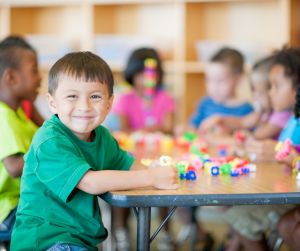Nappies in class – and what parents should be doing
 An alarming poll of almost 1,000 primary school teachers and senior staff revealed that half of new pupils aren’t ‘school ready’.
An alarming poll of almost 1,000 primary school teachers and senior staff revealed that half of new pupils aren’t ‘school ready’.
There has for some time been a percentage of four-year-olds who turn up at school barely able to eat properly and still wearing nappies.
Some parents, who perhaps began school in this manner themselves, seem unable or unwilling to ensure their children develop as they ought to in their formative years.
Instead, they think it should be for the school to sort out. It isn’t. Schools are for teaching.
It seems the pandemic and associated lockdowns have led to more children being unprepared for their first term.
One in four teachers said over half the children didn’t know how to listen or respond to simple instructions and struggled to play with others.
A third cited similarly high numbers having difficulties holding a pencil.
Other children lacked basic numeracy and language skills, couldn’t eat by themselves and were not toilet trained.
The increase has been put down to parents spending too long staring at their phones, but also because children spent less time in nurseries due to lockdowns.
Without that early, pre-school interaction and education that prepares children for school it is perhaps no surprise that there has been an increase in four-year-olds unprepared for that first term.
Teachers are there to teach – not to change nappies – and time away from teaching means children’s education suffers.
With nurseries back open I’d expect the numbers of ‘unprepared’ children to fall in September.
But parents can still help their children by ensuring their little ones are as prepared as they can be.
Some things ought to be essential; children should be toilet trained, they ought to be able to hold a pencil and be able to follow instructions and communicate.
But there are other things parents can do to help give their children the best possible start.
Simply talking to a child while looking them in the eye should be obvious, but with many adults’ eyes glued to their phones, it isn’t.
There should be a focus on reading to children as early as possible – unfortunately many parents can’t be bothered.
Each book should be more challenging than the last. It starts with basic picture books with very few words – naming of household items, animals etc.
This then extends to reading very simple sentences. Reading is a key skill and developing a love for books is crucial in the education of a child.
Parents should make sure that there is a specific time reading happens each day, so it becomes a habit and something to look forward to.
It’s good to reward a child by reading them a story they can’t yet read for themselves.
Learning the letters of the alphabet and the sounds they make is also important. This’ll give children a head start.
When children watch a parent speaking, they are more easily able to develop these skills for themselves, by copying – and it works for writing, too.
All children should be able to say the 26 letters of the alphabet as early in their education as possible.
The quick, brown fox jumped over the lazy dog.
Numeracy is also important, and parents can help get their children off to a flying start – even if they were hopeless at maths themselves.
Mums and dads can teach their children the numbers up to ten, and then gradually extend it to a hundred.
This can be physicalised with objects and images. The simple times tables of 2, 5 and 10 are a good start. They can also learn these by addition; 10 add 10 is 20 etc.
After all, multiplication is really just repeated addition.
Children can learn basic shapes as this improves their visual awareness and gives them the basics of geometry.
Children’s experiences are also important – visits to museums that have interactive installations are really good. It is also of benefit to see shows and live theatre that is appropriate.
As much as anything it is important to enrich a child’s experience of the world as much as possible.
One crucial piece of advice is to restrict children’s use of electronic devices. Yes, they keep the little ones quiet, yes they might learn things from them, and yes everyone else’s children spend time on them as well.
But too much time on a phone or tablet will restrict a child’s development. There is no replacement for a parent’s time and delegating childcare to a box of electronics is not the best way to bring up a child.
Unless there are particular problems, all children should start at school able to go to the toilet, hold a pencil and follow instructions.
The more parents can do beyond this, the better their children will do at school and those with the best starts generally go on to have the better jobs.
All parents claim to love their children – and they can prove it by making sure they are prepared for school.
ends